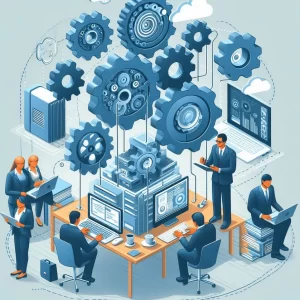Moral Possibilities in Movie Games: “A Subject of Time”
In an episode of Star Trek: The Upcoming Era named “A Make any difference of Time,” Rasmussen, a time-touring historian from the foreseeable future, visits the Starship Organization. His target is to relive the Enterprise’s “record-transforming” tries to help a dying world whole of harmless life, but he is certain by a moral code that forbids him from revealing the final result of the ship’s endeavours to its crew.
In a crucial second, Geordi LaForge, the engineer of the Enterprise, asks Captain Picard if he can continue being on the world to support information the recovery attempt. Picard turns to search at Rasmussen, who is aware of no matter whether Picard’s trusted officer and near friend will die because of his choice. Picard reluctantly offers LaForge authorization to aid, although Rasmussen smiles, casually intrigued, and remarks to himself, “LaForge remained under.”
On listening to Rasmussen’s line, I was quickly reminded of a specified kind of YouTube video clip title. “Mass Influence: Ashley stays guiding,” “Mass Impact 3: The Quarians Loose,” and “Notorious 2: Zeke Dies” are all examples. Identical to Rasmussen’s statement, all of these titles give temporary, soon after-the-actuality labels to online video match selections that, in the second, are intended to have psychological and ethical effect.
The ethical problem Picard faces in “A Make a difference of Time” can be paralleled with video game morality in far more techniques than a person. The most effective position to start out is a scene where Picard phone calls Rasmussen to his personalized place of work. He is presented with a decision not compared with the moral options in several story-pushed video games:
“I think about you know why I have asked you listed here.”
“Yeah, I have a rather superior thought,” responds Rasmussen.
“I’m confronted with a predicament. There is a earth beneath us which is little by little turning to ice, and except if we do one thing about it, I am instructed that in a make a difference of months, 1000’s, possibly tens of 1000’s, will die.”
“So, what is your dilemma?”
“Commander La Forge has a achievable option. The margins of error are particularly important, but if effective, there’ll be no additional menace.”
“And if it truly is not successful?”
“Each individual dwelling issue on the planet will perish.”
“So do absolutely nothing and 1000’s will die. Do a thing and thousands and thousands could die. Which is a tricky option.”
“Not if you ended up to help me.”
Think about Picard’s ask for as an analogue to the moment when an RPG player faces a alternative that could result in the demise of his favored character. Fearing this, he goes to YouTube or a wiki manual to come across a way to maintain the character alive. The scene addresses this urge as it proceeds:
“There are twenty million life down there, and you know what took place to them. What will occur to them,” Picard emphasizes.
Rasmussen pauses for a instant, then responds, “And why did you ask to see me?”
“Mainly because your presence presents me possible accessibility to a form of information that I’ve under no circumstances experienced obtainable to me before.”
The “type of data” that Picard refers to is know-how of the route that immediately connects his actions to their results. Only Rasmussen can see this path, but his presence usually means that it exists.
In lots of video clip games, builders produce a technique that decides accurately how participant possibilities lead to results. Irrespective of whether the player immediately sees it or not, it is out there someplace, transcribed in an on the internet tutorial, or concealed deep in the game’s code.
In either situation, the mere existence of this expertise transforms selections into acts of self-denial. When an founded, uncomplicated process for identifying the most effective decisions exists, producing moral options primarily based entirely on personal inner thoughts and opinions gets illogical. No matter of the energy of the player’s convictions or self confidence, the procedure will perform as it was made, and a person possibility will normally direct to the very same result.
In “A Matter of Time,” Picard faces the identical difficulty. As he states, “I have two choices, but possibly way, a single edition of historical past or one more will wend its way ahead.” Picard realizes that with information of fate basically accessible, the only “suitable detail to do” is to choose the very best result for the planet, and to tutorial his decisions by selecting apart the route foremost to it. Picard explains to Rasmussen, “I need to get gain of each achievable asset. It would be irresponsible of me not to request you here.”
As prolonged as a course of action for specifically connecting decisions to results exists, people’s thoughts will generally be tempted to wander in the direction of figuring out the system, towards next-guessing their instincts in get to make a decision the very best destiny for their private planet.
Rasmussen’s future response reveals the difficulty with this line of contemplating. Put off by Picard’s ask for, he responds “We are not just conversing about a selection. It seems to me like you’re attempting to manipulate the future.”
This is the key concept of “A Issue of Time.” There is a variance in between picking out and manipulating. Even however there is a path that connects a person’s options to their outcomes, it can only be witnessed from the upcoming. In the existing, human perception is much far too minimal to picture each individual achievable component that could affect a determination. “Producing a decision” describes a second in which, amidst this chaos and uncertainty, we location importance on our steps. Only mainly because there is no way to identify how our possibilities healthy into fate can we confidently aim on our personal opinions, feelings, and consciences when making them.
Soon after Rasmussen refuses to enable, Picard describes this additional personalized morality: “By refusing to aid me, you left me with the very same decision I experienced to started with. To attempt or not to attempt, to just take a hazard or to engage in it risk-free. Your arguments have reminded me how valuable the correct to pick is. And for the reason that I’ve never been just one to participate in it protected, I pick to try.”
The correct to opt for does not occur from obtaining complete management about the potential. It is dependent on uncertainty. Whether or not by developing random, uncontrollable components that affect a choice’s result, or by not exhibiting the exact end result of every single option, builders can split the path that connects choices to results. As Picard states, it is the deficiency of total regulate that offers selections their magnificence.





